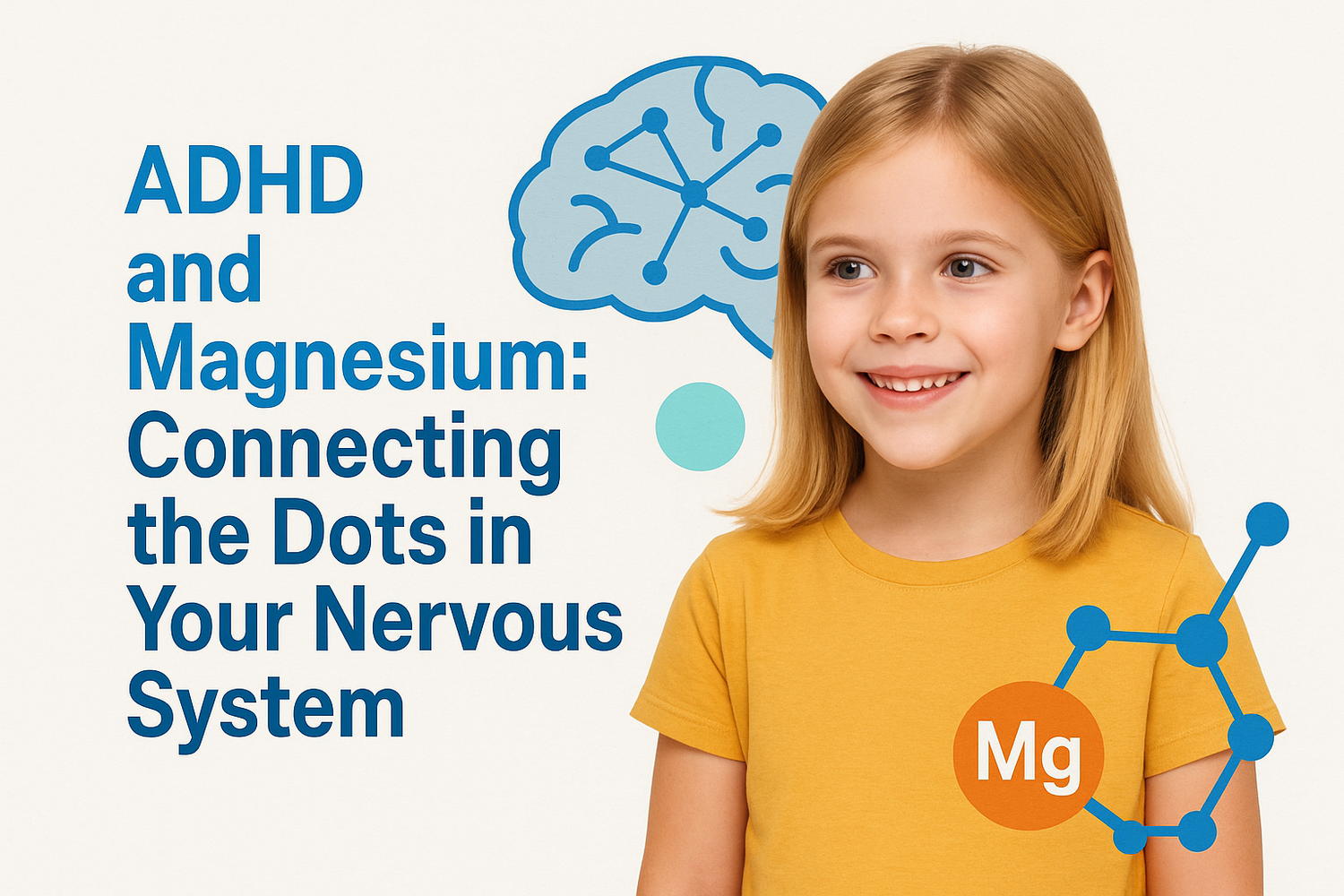The ADHD brain is constantly on the move. But that momentum comes at a cost. Focus can feel slippery. Energy burns out fast. Emotions swing hard. And while there’s no shortage of theories and treatments floating around, sometimes the most powerful support starts with a basic mineral your body already uses every day: magnesium.
Magnesium plays a huge role in keeping your brain and body running, yet it often flies under the radar. For those with ADHD, though, it might be just what they need to find a little more balance. This article aims to break down the connection between magnesium and ADHD so you know how the right support can actually make a difference. And if you ever decide to incorporate clean, reliable supplements into your family’s daily routine, Sunny Sam’s magnesium gummies are the ones you can feel confident about.
Magnesium: What Exactly Does It Do?
Magnesium is involved in over 300 enzymatic processes in the human body. That means it has its hands in just about everything, from how your muscles contract to how your brain processes information.
When it comes to your nervous system, magnesium plays a key role in keeping things steady. It regulates neurotransmitters, including GABA and dopamine, which are both essential for focus, mood, and sleep. It also helps prevent excessive stimulation by calming overactive nerve activity.
In other words, magnesium helps your brain pump the brakes when things get too intense. It brings a grounding effect that can be especially helpful for people who struggle with restlessness, irritability, or constant mental noise. It also helps your body manage stress, improve quality of sleep, and maintain better energy throughout the day.
If your magnesium levels drop, you might not feel it right away, but your body will. Brain fog sets in. Muscles tighten. Sleep gets worse. Focus scatters. And for someone already dealing with ADHD, those effects can compound quickly.
The ADHD Brain and Magnesium
ADHD affects how the brain processes attention, emotion, and executive functioning. It often involves irregularities in the signaling of dopamine, a neurotransmitter that helps regulate motivation and reward systems. On top of that, many people with ADHD experience sensory overload and emotional reactivity, which can make daily life feel intense.
The brain is already working in high gear, and magnesium is one of the minerals that helps keep that engine from overheating. For people with ADHD, that support may be even more important.
Why Magnesium Levels May Deplete Faster in ADHD
Researchers have found that children and adults with ADHD tend to have lower magnesium levels than those without. It’s not entirely clear why, but several factors could be at play:
-
Chronic stress can increase magnesium loss through urine
-
Stimulant medications may interfere with magnesium absorption or metabolism
-
Poor sleep and irregular eating patterns can reduce intake or deplete stores
-
Higher nervous system activity may simply burn through it faster
The symptoms of magnesium deficiency often look a lot like common ADHD struggles:
-
Trouble sleeping
-
Increased anxiety or irritability
-
Muscle tightness and tension
-
Low energy and fatigue
-
Difficulty focusing or calming down
That overlap doesn’t mean magnesium is a fix for ADHD, but it does suggest that low levels could be adding fuel to the fire. Supporting magnesium levels could help reduce some of that daily intensity.
Potential Benefits of Magnesium for ADHD
As we just said, magnesium is definitely not a cure, but it can still help those affected with their day-to-day challenges. Let’s take a look at what exactly happens when magnesium levels are balanced and your brain and body start functioning smoothly.
Better Sleep Quality
Getting restful sleep isn’t easy when your brain won’t hit the brakes. For many people with ADHD, nighttime can bring a surge of thoughts and an inability to wind down. Magnesium helps by supporting melatonin production, which is the hormone that signals your body it’s time to sleep. It also has a calming effect on the central nervous system, which can make it easier to relax both mentally and physically.
Consistent magnesium intake has been linked to deeper, more restorative sleep, something people with ADHD often struggle to get. And better sleep doesn’t just feel good. It directly impacts mood, emotional regulation, memory, and executive functioning. For a brain that works in overdrive, better rest can make a big difference.
Reduced Restlessness
Physical restlessness can be exhausting, especially when it shows up in everyday situations like work meetings, school lessons, or quiet evenings at home. That jittery, on-edge feeling isn’t just uncomfortable, it can be distracting and disruptive.
Magnesium plays a key role in muscle function and nervous system regulation. It helps relax the muscles and ease the constant tension that often builds up in people with ADHD. By calming excitatory nerve activity, magnesium may reduce those impulsive urges to move, tap, shift, or fidget. It won’t eliminate restlessness completely, but it can help dial it down so your body and mind can settle more easily.
Improved Focus
Focus isn’t just willpower but rather a neurochemical process that depends on balance. Magnesium supports several neurotransmitters that influence attention, including dopamine, which helps regulate motivation and the brain’s reward system.
When magnesium levels are low, dopamine signaling can become irregular, which may make it harder to stay on task or feel engaged. By supporting neurotransmitter activity and promoting better communication between brain cells, magnesium may help reduce mental noise and improve sustained attention. The result? Less distraction, less overwhelm, and more clarity as you move through your day.
Why Sunny Sam's Magnesium Is the Smartest Choice
Not all supplements are built the same. When you’re choosing something to support your family’s brain health and focus, quality matters. Sunny Sam understands that wellness isn’t about hype, it’s about ingredients that are safe and actually work. Here’s why Sunny Sam’s magnesium stands out:
-
Clean ingredients: Sourced with care, no artificial fillers or preservatives
-
Easy absorption: Formulated with bioavailable forms of magnesium your body can actually use
-
Family-friendly formula: Gentle and effective, suitable for adults and kids
-
Third-party tested: Every batch is tested for purity, potency, and safety
-
Sugar-free: No added sugars, no unnecessary extras
-
Targeted support: Designed to promote calm, focus, and steady energy throughout the day
Wrapping Things Up
Magnesium might not be the first thing you think about when it comes to ADHD, but it deserves a spot on your radar. It plays a huge role in calming the nervous system, supporting focus, and helping your brain manage everyday stress. Low levels won’t cause ADHD, but they can make the symptoms feel a lot louder. Paying attention to magnesium is one more way to support the ADHD brain in a grounded, holistic way.
As always, start by tuning into your body. Talk to your healthcare provider, look at your nutrition, and think about how your lifestyle supports your nervous system. If magnesium feels like the right next step, Sunny Sam is here to help. Their formulas are clean, gentle, and crafted to give your brain what it needs to stay balanced and focused every day.
Wellness starts with the basics, and magnesium might just be one of the most powerful basics out there.



